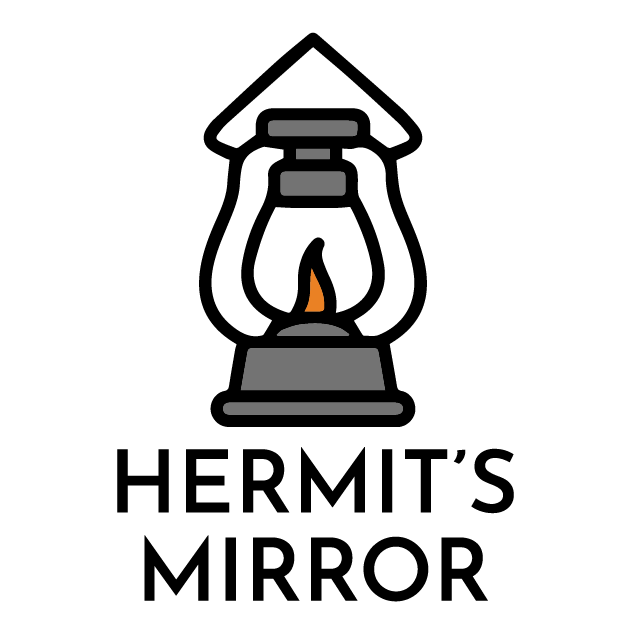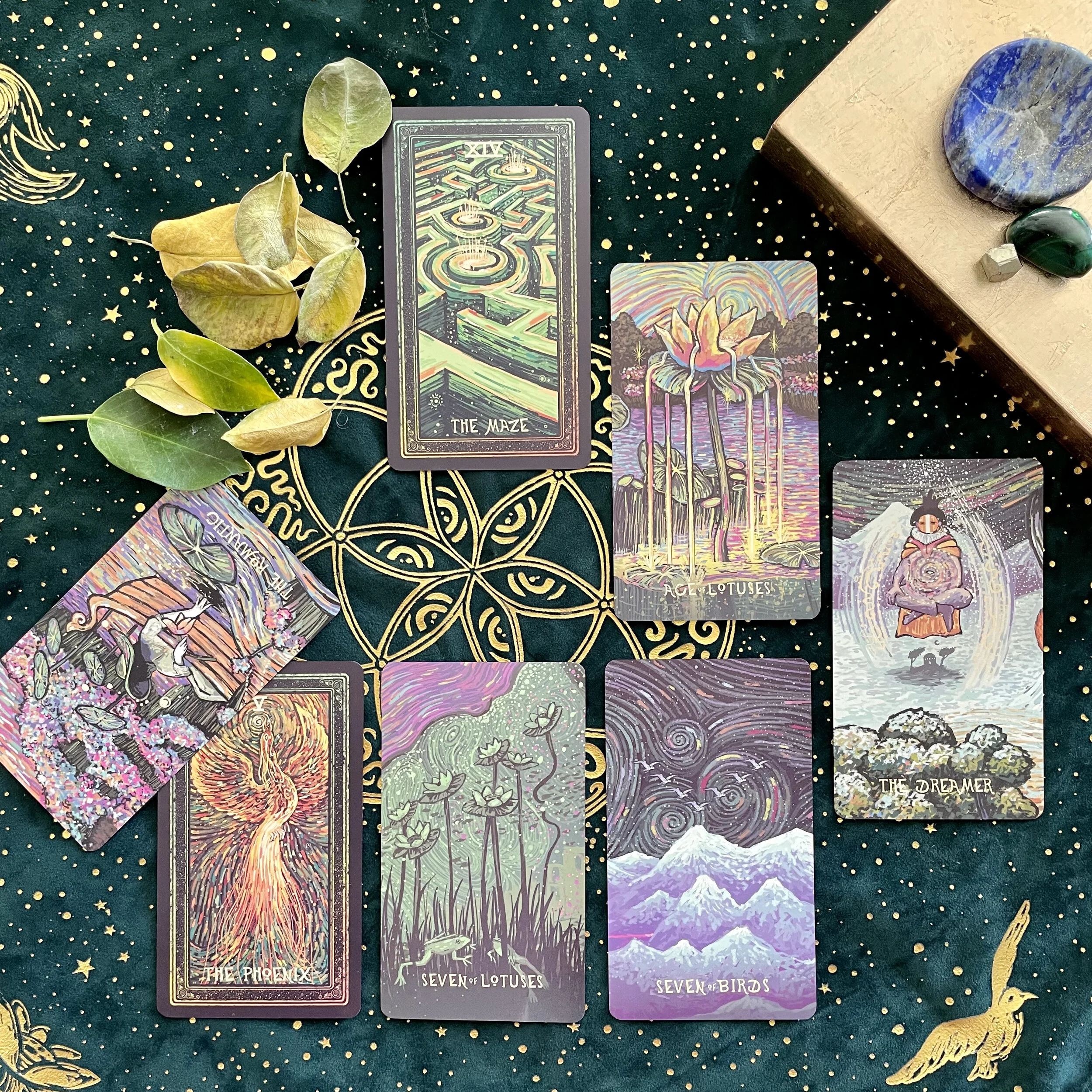Deck Interview: Cosma Visions Oracle
Goodness, but I’m behind on deck interviews. I backed the Cosma Visions Oracle by James R. Eads as soon as it launched on Kickstarter last year because I love the Green Glyphs Lenormand (interview here) and Prisma Visions Tarot (interview here), and I’ve used it a handful of times since it arrived this past spring (?) maybe. I don’t even remember. I was really excited to use this deck with ancestral and past life work since it’s designed to examine the space between lives and ostensibly reincarnation. But I didn’t. I had the tools I needed. Now that I’ve done the deck interview, I see where this deck might provide additional insights. I doubt I will replace the Vitruvian edition of the Spirit Keeper’s Tarot as my go-to for such work (except perhaps for the Revelation edition), but I do think that there’s a lot to consider with the Cosma Visions.
As mentioned, I’m behind on the deck interviews I’d planned once upon a time, and I was pulling decks off of my shelf that I hadn’t yet interviewed, and I felt drawn to this one. It turns out that it’s very relevant to this current moment. The first card, the Seven of Lotuses, recalls a card that I have recently seen pop up a few times, the mirrored card of the Seven of Cups. Reading through the guidebook, I was surprised to read the creator’s articulation of this deck’s 16 oracle reflections of the 16 tarot court cards. (The deck is an oracle but structured around a tarot deck.) It’s very in line with my understanding of the court cards as ways of being. This isn’t unusual since the court cards are often read as personalities and characteristics, which are ways of being. But the explanation is about the role that these court card figures, all uniquely named, have within our own personality matrix. We include them all within us. Again, that’s not earth-shatteringly new, but it’s important for what I’m working on this month. There are other important resonances for my current straddling of two worlds right now, from the Maze to all of the Cups and the Dreamer.
I’m using my own deck interview spread, which you can find explained right here on my blog.
Interviewing the Cosma Visions Oracle
What major lesson are you here to help me learn? Seven of Lotuses
Through which divine energy can we best communicate? The Maze
In what area can you aid me to help others? Seven of Birds
In what area could your guidance be easily misunderstood? The Phoenix
What can I do to keep our communication clear? The Romantic (reversed)
How can I use your guidance for the highest good? Ace of Lotuses
How will I know when we’re ready for a new lesson? The Dreamer
Most of my spreads offer distinct questions for each card, and the deck interview is no exception, but this particular reading is so unified in its reading of mutually exclusive worlds and the return to love that I need to start there. The Seven of Lotuses, the Romantic (the reflection of the Knight of Cups), and the Dreamer (the reflection of the Queen of Swords) all point to my current walk through competing worlds, of trying to live multiple realities at once. As I recently wrote about in my latest newsletter, this is occurring quite literally through dreams. It’s been incredibly productive, as promised by some of the cards I drew for my Hermit’s Journey challenge. And it hasn’t required much, if any, conscious energy from me, which is great. I have a lot of energy to give, and I’m not using all of it right now, so why not share the space with those who need a little retreat?
But less metaphysically, this feels like an opportunity to step more fully into the fantastical, at least with this deck. While deck interviews are always, on some level, self-interviews, they are also specific to the deck, and in this case, I think that the deck is calling me to not waste its gifts on the mundane or even the particularly coherent when reading for others. There are multiple paths indicated by the Seven of Lotuses (and the Romantic and Dreamer), but there’s also a need to not try to follow them all. The Maze is the divine connection, and of course it reminds me of my own Labyrinth theme in the Life Line Tarot, but it also signals that this life is just the one life. I may have lots of capacity and opportunities to explore everything, but choices do need to be made, and that’s not a bad thing. (It’s also fittingly in line with my recent reading of the Midnight Library by Matt Haig.)
That’s reinforced by the Seven of Birds and the inclusion of the Phoenix in the position of misunderstanding. There is no easy way to coherence. That’s not the point. Not all roads can be taken because there are infinite mutually exclusive options, and we do not have infinite time even if one choice did not preclude others. As the Romantic in reverse explains, you can’t dwell on every possibility that has passed by or that might arise because that leads to regret and anxiety, to losing oneself in the pasts and futures that will never exist for you. The Seven of Lotuses and the Seven of Birds point to the necessity of being thoughtful in making the decision that leads to the center of the Maze. This is perfect for the sort of problem-solving work that I do, for others and for myself. But what’s different about this particular deck’s “conversation” about having to choose paths is that love for oneself undergirds it all. The Seven of Birds here is not strategy and cunning, per se, but a calculation. What choices will we be willing to accept that we’ve made?
The choices referenced in this deck interview lead to futures that may be harder or easier, but they’re all choices that are one’s own to make within the context of one’s life. There arguably may be no wrong choices are far as cosmic spirituality is concerned. The Maze is full of possible paths, and they are all contained within oneself. There’s a certain comfort in that for those of us who worry overly much about choices that, usually, don’t matter all that much to the longer trajectory of our lives. So much of what we think of as right or wrong is the result of very short-sighted thinking. Of course there are material consequences to our actions and choices (that’s fundamental), but how many of those consequences really, truly matter to our entire time in this life? Probably not nearly as many as we worry about.
There’s very real movement in the cards as they connect to each other visually, one to the next (as in the Prisma Visions), and it’s a reminder to just keep moving through. Don’t dwell too long in any one moment or space if it’s not right. Come back to it in another life.
As an aside, I’m drawn to the fact that the Maze, card 14, and the Phoenix, card 5, are not only relevant to me right now in this reading and literally (in the city of Phoenix and with my Labyrinth-themed Life Line Tarot), but they also speak to each other numerologically. I’ve written but not posted about tarot’s numerological fives and the shared ideals of the Hierophant (5) and Temperance (14), even if they come about through nearly opposite modes, and how we can use that to better understand the minor fives. These reflections of those cards, the Phoenix and the Maze, both represent awakening, but one is through unity and the other multiplicity of selves. The interview is reminding me to choose the latter right now and not worry quite so much about the illusion of unity.
The cards shown here come from the first edition of the Cosma Visions Oracle © James R. Eads, 2020. The second edition of the Cosma Visions Oracle is available for pre-order through the James R. Eads Shop.

